
Opus Dei, formally known as the Prelature of the Holy Cross and Opus Dei, is an institution of the Catholic Church whose members seek personal Christian holiness and strive to imbue their work and society with Christian principles.
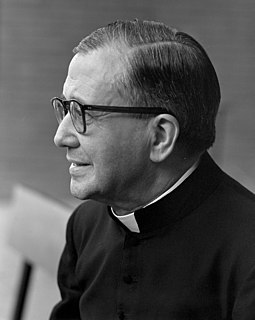
Josemaría Escrivá de Balaguer y Albás was a Spanish Roman Catholic priest. He founded Opus Dei, an organization of laypeople and priests dedicated to the teaching that everyone is called to holiness by God and that ordinary life can result in sanctity. He was canonized in 2002 by Pope John Paul II, who declared Josemaría should be "counted among the great witnesses of Christianity."
Spiritual is the adjective for spirit.
The universal call to holiness is a teaching of the Roman Catholic Church that all people are called to be holy, and is based on Matthew 5:48: "Be you therefore perfect, as also your heavenly Father is perfect". In the first book of the Bible, the call to holiness is expressed in the Lord's words to Abraham: "Walk before me, and be blameless".

Catholic charismatic renewal is a movement within the Catholic Church that is part of the wider charismatic movement across historic Christian churches. It has been described as a "current of grace". It began in 1967 when Catholics from Duquesne University attended a Protestant worship service and claimed to have been "baptized in the Holy Spirit". It is heavily influenced by American Protestantism, especially Pentecostalism, with an emphasis on having a "personal relationship with Jesus", deep emotional experiences, and expressing the "gifts of the Holy Spirit".

Javier Echevarría Rodríguez was a Spanish bishop of the Roman Catholic Church. Until his death, he was the head of the Prelature of the Holy Cross and Opus Dei. He held doctorates in both civil and canon law.
Opus Dei and Catholic Church Leaders discusses the comments and observations of Popes, Cardinals and other leaders of the Catholic Church as regards the Personal Prelature of the Holy Cross and Opus Dei.
This is a bibliography of works about Opus Dei, also known as the Prelature of the Holy Cross and Opus Dei, which was founded by Josemaría Escrivá.
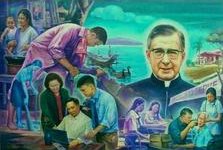
Teachings of Opus Dei are the teachings of the founder of Opus Dei, St. Josemaría Escrivá de Balaguer.
Opus Dei in society refers to the social mission, general social strategy, social activities, work, relationship with politics and other aspects of Opus Dei.

The Priestly Society of the Holy Cross is an association of Catholic diocesan priests which is integrally united to the Prelature of Opus Dei.
Canonization of Josemaría Escrivá de Balaguer discusses John Paul II's decision to canonize Josemaría Escrivá, founder of the Prelature of the Holy Cross and Opus Dei, more commonly known as Opus Dei.
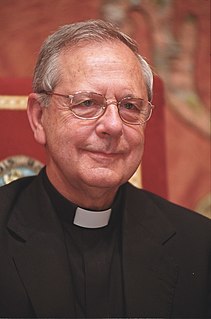
Pedro Rodriguez is a theologian who specializes on church studies or ecclesiology. He has written dozens of books and articles on theology. He is priest of the prelature of Opus Dei. He teaches at the University of Navarra in Pamplona, Spain and was its dean of theology for many years.
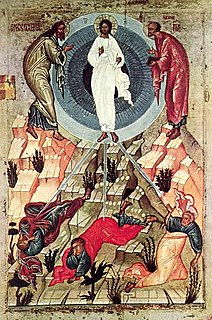
Catholic spirituality includes the various ways in which Catholics live out their Baptismal promise through prayer and action. The primary prayer of all Catholics is the Eucharistic liturgy in which they celebrate and share their faith together, in accord with Jesus' instruction: "Do this in memory of me." The Catholic bishops at the Second Vatican Council decreed that "devotions should be so drawn up that they harmonize with the liturgical seasons, accord with the sacred liturgy, are in some fashion derived from it, and lead the people to it, since, in fact, the liturgy by its very nature far surpasses any of them." In accord with this, many additional forms of prayer have developed over the centuries as means of animating one's personal Christian life, at times in gatherings with others. Each of the religious orders and congregations of the Catholic church, as well as lay groupings, has specifics to its own spirituality – its way of approaching God in prayer to foster its way of living out the Gospel.
In Christian theology, the gift of miracles is among the spiritual gifts (charismata) mentioned by St. Paul in his First Epistle to the Corinthians. As a charism, the gift is imparted to individuals by the power of the Holy Spirit. The view of Cessationism held that the charismata were exclusively for Apostolic times, and therefore the gift of miracles ceased with the writing of the last book of the Bible or the death of St. John the Apostle. In Continuationism, on the other hand, the gifts are held to be possible throughout the history of Christianity, and to have occurred since Apostolic times.

Interior life is a life which seeks God in everything, a life of prayer and the practice of living in the presence of God. It connotes intimate, friendly conversation with Him, and a determined focus on internal prayer versus external actions, while these latter are transformed into means of prayer.
The Roman Catholic Church has often held mortification of the flesh, as a worthy spiritual discipline. The practice is rooted in the Bible: in the asceticism of the Old and New Testament saints, and in its theology, such as the remark by Saint Paul, in his Epistle to the Romans, where he states: "If you live a life of nature, you are marked out for death; if you mortify the ways of nature through the power of the Spirit, you will have life.". It is intimately connected with Christ's complete sacrifice of himself on the Cross: "those who belong to Christ have crucified nature, with all its passions, all its impulses". Christ himself enjoined his disciples to mortify themselves when he said: "If any man would come after me, let him deny himself and take up his cross and follow me". According to the Catechism of the Catholic Church, "[t]he way of perfection passes by way of the Cross. There is no holiness without renunciation and spiritual battle. Spiritual progress entails the ascesis and mortification that gradually lead to living in the peace and joy of the Beatitudes: ‘He who climbs never stops going from beginning to beginning, through beginnings that have no end. He never stops desiring what he already knows.’". The purpose of mortification is to train "the soul to virtuous and holy living". It achieves this through conforming one's passions to reason and faith. According to the Catholic Encyclopedia, internal mortification, such as the struggle against pride and self-love, is essential, but external mortification, such as fasting can also be good if they conform with a spirit of internal mortification.
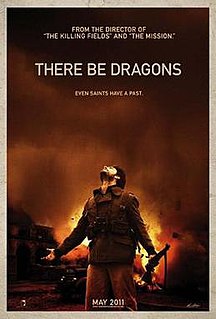
There Be Dragons is a 2011 historical epic war drama film written and directed by Roland Joffé. Set during the Spanish Civil War of the 1930s, it features themes such as betrayal, love and hatred, forgiveness, friendship, and finding meaning in everyday life. It includes the story of soldiers, a journalist, his father, and a real-life priest, Josemaría Escrivá, the founder of Opus Dei, who was canonized as a Roman Catholic saint.

Spiritual communion is a Christian practice of desiring union with Jesus Christ in the Eucharist. It is used as a preparation for Mass and by individuals who cannot receive holy communion.

Francisco Javier López Díaz is a Spanish theologian and a priest of the Catholic Church incardinated in the personal prelature of Opus Dei. He currently teaches at the Pontifical University of the Holy Cross in Rome.